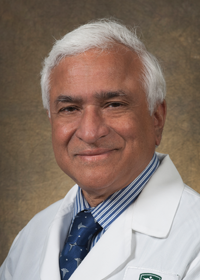African American kidney transplant recipients hospitalized in Detroit with COVID-19 infections during the height of the pandemic gradually improved and made a full recovery, according to a study published by Wayne State University School of Medicine physician-researchers.
“Favorable outcome of COVID‐19 among African American renal transplant recipients in Detroit,” published in Clinical Transplantation: The Journal of Clinical and Translational Research, found that despite risk factors for a poor outcome among such patients infected with COVID-19, the prognosis for recovery for most was “excellent.”
The use of corticosteroids and perhaps maintaining optimal levels of calcineurin inhibitor may have contributed to a muted adverse host inflammatory response, leading to an improved outcome, said Pranatharthi Chandrasekar, M.D., professor of Internal Medicine, chief of the Division of Infectious Diseases and principal author of the study.

Transplant recipients are especially vulnerable to infection given their comorbidities and immunosuppression factors. This is the first published study reporting outcomes in a group comprised solely of African American kidney transplant recipients infected with and hospitalized for COVID‐19.
The researchers followed a cohort of 25 African American kidney transplant recipients hospitalized at the Detroit Medical Center between March 1 and May 1, 2020, for COVID-19 infection after positive nasal swab tests. Four were transferred to intensive care, one required intubation and one died. Three of the patients were hospitalized with the infection within six months of receiving a kidney transplant.
The majority of patients in the study – 64% -- demonstrated initial radiographic findings of pneumonia compatible with COVID‐19 infection, and 44% had oxygen saturation rates of less than or equal to 94%, qualifying as severe illness according to Infectious Diseases Society of America treatment guidelines. During their hospitalization, 64% of the patients required further measures such as oxygen supplementation or mechanical ventilation.
The majority of patients had a history of hypertension, 13 had diabetes, 11 had cardiovascular disease, 10 had pulmonary disease and three had a preexisting history of malignancy. Only five had a body mass index within normal range, five were overweight and 15 were obese.
Despite the chronic health conditions, all of the recovered patients were followed after discharge from the hospital for a median of 45 days and made full symptomatic recoveries.
The authors noted that hospital guidelines for COVID‐19‐specific therapy varied as the pandemic evolved. The guidelines initially recommended hydroxychloroquine for all patients admitted and at risk for severe disease. Later guidelines included oral or intravenous steroids for some patients. Of the patients in the study, eight received hydroxychloroquine only, while 12 were treated with a combination of hydroxychloroquine and steroids.
Co-authors of the study include Claudia Jarrin Tejada, M.D., assistant professor of Internal Medicine, Division of Infectious Diseases; Mareena Zachariah, M.D., associate professor of Internal Medicine, Division of Nephrology; Angela Cruz, M.D., fellow, Division of Infectious Diseases; Shakir Hussein, M.D., Department of Surgery; Elizabeth Wipula, Detroit Medical Center Transplant Pharmacy; Nicole Meeks, WSU medical student; and Jeff Wolff, advanced practice provider, Detroit Medical Center.